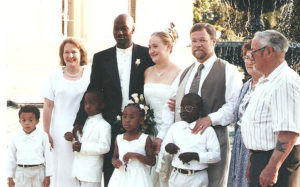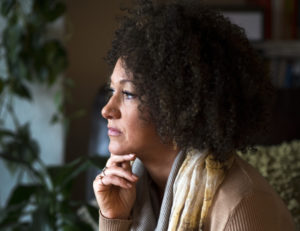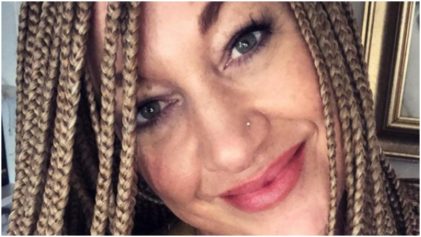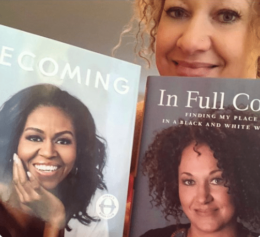
Rachel, believed to be her wedding day with husband Kevin Moore. Adopted daughter Esther, 2nd from left.
By Manny Otiko
Although Rachel Dolezal, the white woman who faked being Black, has stepped down from her NAACP leadership role, she doesn’t seem to backing down from the controversy she’s caused.
She was interviewed by Matt Lauer on The Today Show and on Tuesday she conducted a lengthy interview with MSNBC’s Melissa Harris-Perry. Harris-Perry has taken a more sympathetic tone towards Dolezal and has drawn criticism from commenters on Twitter for her stance. Dolezal said she felt she was at the center of the eye of a storm and was not aware of most of the things being said about her.
“I haven’t seen probably 90 percent of what’s been put out there,” she said. “I feel like I’m aware of the narrative enough to kind of guess what the fallout is going to be.”
In the wide-ranging interview, Dolezal touched on a number of issues such as race, identity, her convoluted background and her fractious relationship with her biological family, which includes allegations of child abuse. Dolezal said she started identifying with Black culture when she was a young child.
“Another aspect would be that I, as a—from a very young age, felt a spiritual, visceral, this feeling of central connection with Black is beautiful, you know, just the Black experience and wanting to celebrate that,” Dolezal said. “And I didn’t know how to articulate that as a young child, at the age of kindergarten or whatever, like you don’t have words for what’s going on. But certainly that was—that was soaked in. It was totally conditioned to not own that and to be limited to whatever biological identity was thrust upon me and married to me and so I kind of felt pretty awkward a lot of the time with that.”
Dolezal’s also touched upon her parentage. In a previous interview with NBC’s Savannah Guthrie, she questioned whether Larry and Ruthanne Dozelal were really her birth parents.
“There’s no biological proof that Larry and Ruthanne are my parents,” she said.
She sees the concept of family as being “fluid.” She identified Alfred Wilkinson, a Black man who she has been pictured with, as her father.
“He’s amazing, absolutely amazing,” she said.
Dolezal has a tumultuous relationship with her biological parents, Larry and Ruthanne, who are fundamentalist Christians and adopted several Black children. Her parents decision to “out” her maybe related to her decision to seek custody of her adopted brother. Dolezal’s biological brother, Joshua, is also facing sex abuse charges for allegedly molesting Esther, his adopted sister, according to BuzzFeed.
When Harris-Perry asked if she was a con artist, Dolezal pushed back and defended her life’s work.
“I don’t think anything that I have done with regard to the movement, my work, my life, my identity, I mean, it’s all been very thoughtful and careful, sometimes decisions have been made for survival reasons or to protect people that I love,” she said. “And all things included, when it boils down, the entire world could say stand down. But when it comes to being there for my kids, for my sister, I would never stand down on that.”
Dolezal’s also stood by the claim that she is Black, saying she has lived the African American experience.

She also addressed her choice of traditional Black hairstyles. In the past she has worn braids and her hair now seems to be styled as an Afro.
“It also felt like an affirmation of Black is beautiful, you know? Because for so many centuries, you know, there’s been … the relaxers and the long weaves and the skin bleaching and all that fallout of psychological disorientation and certainly trauma came,” Dolezal said.
She also pointed out she had learned to style her adopted Black sister’s hair and had helped other Black girls adopted by white families fix their hair.

